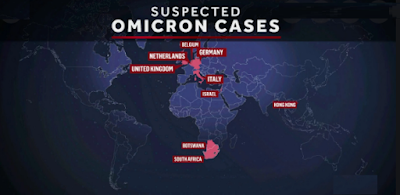What Is Omicron Variant?
Omicron Variant is a new mutation. Omicron Symptoms are likely causing high pulse rate but Omicron Variant has yet to be determined by WHO, of how exactly this virus are affecting different regions.
The new variant is concerning because it "has a large number of mutations" that potentially makes this virus more contagious than other variants, according to Fauci.
Where Is Omicron Variant Originated?
it was first reported in south africa. where South African Doctor Who Raised Alarm About Omicron Variant: 'Symptoms Were So Different And So Mild'
it was also reported by doctors that "We don't know that yet, but we're going to assume that's the case," he said, adding that the large number of mutations also suggested the new variant "could evade the protection" of coronavirus treatments such as monoclonal antibodies and convalescent plasma as well as the Covid-19 vaccines.
"These are all maybes, but the suggestion is enough," Fauci said. "This is something we got to pay really close attention to and be prepared for something that's serious. It may not turn out that way, but you really want to be ahead of it."
Omicron Variant Vaccine
Khristopher J. Brooks reported that Pfizer is already testing its vaccine against omicron. Carl Zimmer also reported Friday night for The New York Times that "New Virus Variant Stokes Concern but Vaccines Still Likely to Work."
Omicron Meaning
Definition of omicron is the 15th letter of the Greek alphabet. History and Etymology for omicron is the Middle English, from Greek o mikron, literally, small o alphabet.
How Does Omicron Affects?
The first South African doctor to alert the authorities about patients with the omicron variant has told The Telegraph that the symptoms of the new variant are unusual but mild.
Dr Angelique Coetzee said she was first alerted to the possibility of a new variant when patients in her busy private practice in the capital Pretoria started to come in earlier this month with Covid-19 symptoms that did not make immediate sense.
They included young people of different backgrounds and ethnicities with intense fatigue and a six-year-old child with a very high pulse rate, she said. None suffered from a loss of taste or smell.
“Their symptoms were so different and so mild from those I had treated before,” said Dr Coetzee, a GP for 33 years who chairs the South African Medical Association alongside running her practice.
On November 18, when four family members all tested positive for Covid-19 with complete exhaustion, she informed the country’s vaccine advisory committee.
She said, in total, about two dozen of her patients have tested positive for Covid-19 with symptoms of the new variant. They were mostly healthy men who turned up “feeling so tired”. About half of them were unvaccinated.
“We had one very interesting case, a kid, about six years old, with a temperature and a very high pulse rate, and I wondered if I should admit her. But when I followed up two days later, she was so much better,” Dr Coetzee says.
There are some encouraging takeaways, such as that a significant portion of those who presented with symptoms of the new variant were unvaccinated, and that her six year old patients "was such much better" within days.
Dr. Coetzee's concerns about the variant also appear to be typical for all other variants, which is that the greatest worry is for the elderly and those with who already have co-morbidities.
Dr Coetzee, who was briefing other African medical associations on Saturday, made clear her patients were all healthy and she was worried the new variant could still hit older people – with co-morbidities such as diabetes or heart disease – much harder.
“What we have to worry about now is that when older, unvaccinated people are infected with the new variant, and if they are not vaccinated, we are going to see many people with a severe [form of the] disease,” she said.
Meanwhile, in the United States, Dr. Anthony Fauci is making headlines for what, unsurprisingly, may be fear mongering. Nicole Acevado for NBC News went with the headline in her Saturday coverage that "Omicron Covid-19 variant could already be in U.S., Fauci says." In her subheadline, however, she notes that Fauci did acknowledge "we have not detected it yet," going on to add that "but when you have a virus that is showing this degree of transmissibility," it will "go essentially all over."
As Acevado also wrote:
The new variant is concerning because it "has a large number of mutations" that potentially makes this virus more contagious than other variants, according to Fauci.
"We don't know that yet, but we're going to assume that's the case," he said, adding that the large number of mutations also suggested the new variant "could evade the protection" of coronavirus treatments such as monoclonal antibodies and convalescent plasma as well as the Covid-19 vaccines.
"These are all maybes, but the suggestion is enough," Fauci said. "This is something we got to pay really close attention to and be prepared for something that's serious. It may not turn out that way, but you really want to be ahead of it."
Dr. Fauci made his remarks on "Weekend TODAY" on NBC.
A Friday night statement from the Centers for Disease Control (CDC) mentioned that there had not yet been cases detected, but that it would quickly know if and when cases were detected. "CDC is continuously monitoring variants and the U.S. variant surveillance system has reliably detected new variants in this country. We expect Omicron to be identified quickly, if it emerges in the U.S," the statement in part read.
As I included in my coverage last night, CBS News' Khristopher J. Brooks reported that Pfizer is already testing its vaccine against omicron. Carl Zimmer also reported Friday night for The New York Times that "New Virus Variant Stokes Concern but Vaccines Still Likely to Work.".
According to WHO World Health Organization, Classification of Omicron (B.1.1.529): SARS-CoV-2 Variant of Concern
26 November 2021 Statement Reading time: 2 min (616 words)
The Technical Advisory Group on SARS-CoV-2 Virus Evolution (TAG-VE) is an independent group of experts that periodically monitors and evaluates the evolution of SARS-CoV-2 and assesses if specific mutations and combinations of mutations alter the behaviour of the virus. The TAG-VE was convened on 26 November 2021 to assess the SARS-CoV-2 variant: B.1.1.529.
The B.1.1.529 variant was first reported to WHO from South Africa on 24 November 2021. The epidemiological situation in South Africa has been characterized by three distinct peaks in reported cases, the latest of which was predominantly the Delta variant. In recent weeks, infections have increased steeply, coinciding with the detection of B.1.1.529 variant. The first known confirmed B.1.1.529 infection was from a specimen collected on 9 November 2021.
This variant has a large number of mutations, some of which are concerning. Preliminary evidence suggests an increased risk of reinfection with this variant, as compared to other VOCs. The number of cases of this variant appears to be increasing in almost all provinces in South Africa. Current SARS-CoV-2 PCR diagnostics continue to detect this variant. Several labs have indicated that for one widely used PCR test, one of the three target genes is not detected (called S gene dropout or S gene target failure) and this test can therefore be used as marker for this variant, pending sequencing confirmation. Using this approach, this variant has been detected at faster rates than previous surges in infection, suggesting that this variant may have a growth advantage.
There are a number of studies underway and the TAG-VE will continue to evaluate this variant. WHO will communicate new findings with Member States and to the public as needed.
Based on the evidence presented indicative of a detrimental change in COVID-19 epidemiology, the TAG-VE has advised WHO that this variant should be designated as a VOC, and the WHO has designated B.1.1.529 as a VOC, named Omicron.
As such, countries are asked to do the following:
- enhance surveillance and sequencing efforts to better understand circulating SARS-CoV-2 variants.
- submit complete genome sequences and associated metadata to a publicly available database, such as GISAID.
- report initial cases/clusters associated with VOC infection to WHO through the IHR mechanism.
where capacity exists and in coordination with the international community, perform field investigations and laboratory assessments to improve understanding of the potential impacts of the VOC on COVID-19 epidemiology, severity, effectiveness of public health and social measures, diagnostic methods, immune responses, antibody neutralization, or other relevant characteristics.
Individuals are reminded to take measures to reduce their risk of COVID-19, including proven public health and social measures such as wearing well-fitting masks, hand hygiene, physical distancing, improving ventilation of indoor spaces, avoiding crowded spaces, and getting vaccinated.
For reference, WHO has working definitions for SARS-CoV-2 Variant of Interest (VOI) and Variant of Concern (VOC).
A SARS-CoV-2 VOI is a SARS-CoV-2 variant:
with genetic changes that are predicted or known to affect virus characteristics such as transmissibility, disease severity, immune escape, diagnostic or therapeutic escape; AND
that has been identified as causing significant community transmission or multiple COVID-19 clusters, in multiple countries with increasing relative prevalence alongside increasing number of cases over time, or other apparent epidemiological impacts to suggest an emerging risk to global public health.
A SARS-CoV-2 VOC is a SARS-CoV-2 variant that meets the definition of a VOI (see above) and, through a comparative assessment, has been demonstrated to be associated with one or more of the following changes at a degree of global public health significance:
- increase in transmissibility or detrimental change in COVID-19 epidemiology; OR
- increase in virulence or change in clinical disease presentation; OR
decrease in effectiveness of public health and social measures or available diagnostics, vaccines, therapeutics. omicron virus is a new emerging virus is yet to be reported from all the world.









